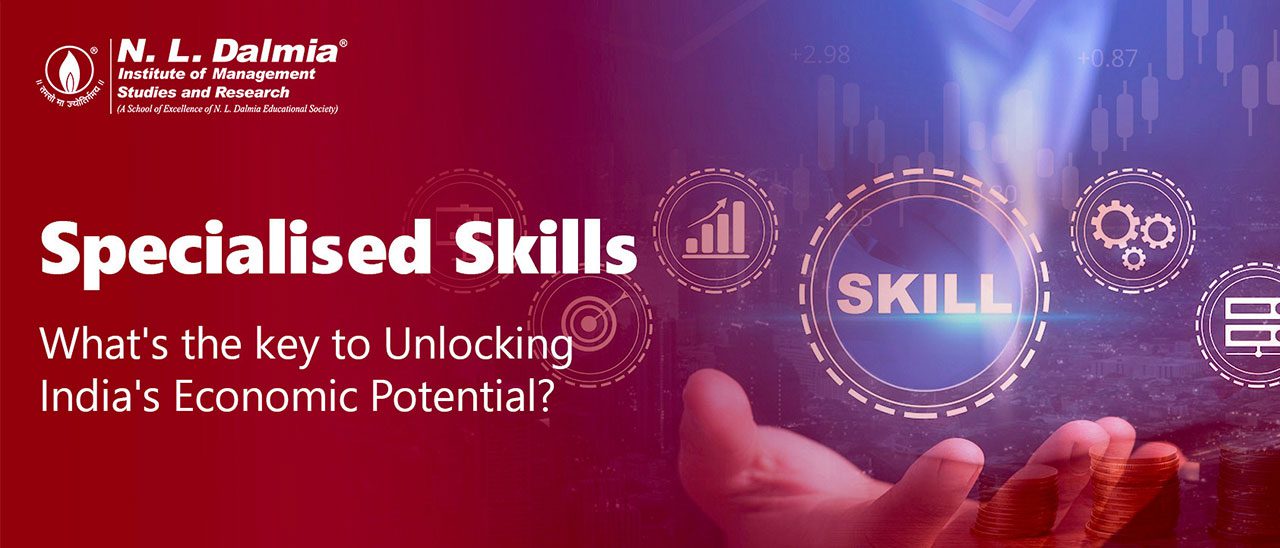Possessing a unique set of skills can significantly enhance one’s career prospects. As industries evolve and new sectors emerge, the demand for specialised skills is more pronounced than ever. This is particularly true in India, where economic growth is both a promise and a challenge.
One effective pathway to acquiring these essential capabilities is through a Post Graduate Diploma in Management (PGDM). This educational choice sharpens individual competencies and prepares aspirants to play pivotal roles in propelling the country’s economic ambitions forward.
The Importance of Skill Development for Inclusive and Sustainable Economic Growth
Skill development is crucial for fostering inclusive and sustainable economic growth. As India strides towards becoming a global powerhouse, the need for a versatile, adaptable and technically proficient workforce cannot be overstated. Skills not only empower individuals but also bolster the economy’s overall productivity, making education and skill development for faster economic growth an imperative strategy.
The modern job market is increasingly segmented, with specific industries requiring niche skills that can often only be acquired through focused training and education. Sectors such as technology, finance, healthcare and management consultancies seek candidates who are academically proficient and equipped with industry-specific knowledge that can contribute to innovative and strategic business solutions.
PGDM Courses: Tailoring Education to Meet Industry Demands
A PGDM course is meticulously designed to bridge the gap between theoretical knowledge and real-world application. These courses are typically framed to instill deep industry-specific knowledge and practical skills immediately applicable in the workplace. For students, a PGDM is not just a degree but a strategic tool that enhances their employability and equips them to address complex challenges in the corporate world.
N. L. Dalmia’s PGDM course plays a critical role in shaping the educational landscape in India. These programs are continually updated to reflect the latest industry trends and demands, ensuring that students are learning what is currently relevant and in demand.
N. L. Dalmia’s Commitment to Nurturing Future Leaders
At N. L. Dalmia Institute, we are dedicated to sculpting the future leaders of India. Our PGDM programs are more than just academic courses, they are transformative experiences that mold students into strategic thinkers and problem-solvers. We understand that the landscape of industry demands is ever-changing and to keep pace, our curriculum is constantly evolving.
Our PGDM courses are designed to meet the dual needs of skill development for inclusive and sustainable economic growth. We provide our students with a robust foundation in management theory, reinforced with practical insights and real-world project experience. This hands-on approach ensures that our graduates are ready for the job market and poised to transform it.
We offer a range of specialisations that cater to various industry sectors. Whether it’s finance, marketing, operations, or human resources, our courses are tailored to meet the specific needs of these diverse fields. Our faculty comprises seasoned professionals and academicians with rich industry experience and a deep understanding of global business trends.
The Strategic Advantage of Pursuing a PGDM
Choosing to pursue a PGDM can significantly alter a student’s career trajectory. The course offers an in-depth understanding of the business world and the opportunity to specialise in a particular field. This dual advantage equips students with a comprehensive skill set that is highly valued in the job market.
Moreover, a PGDM program often includes internships and live projects that provide practical exposure and networking opportunities. These experiences are invaluable as they allow students to apply their learning in real-world scenarios, further enhancing their understanding and skills.
Driving Economic Growth through Education and Skill Development
The role of education in driving economic growth must be considered. By focusing on education and skill development for faster economic growth, India can ensure that its workforce is not only prepared for today’s jobs but also capable of innovating for tomorrow’s jobs. Institutions like N. L. Dalmia are at the forefront of this initiative, providing cutting-edge, relevant education that aligns with global standards and local needs.
Enhancing Employability through Specialised Skill Development
In the context of India’s dynamic job market, specialised skills are not merely an asset; they are a necessity. A PGDM provides a well-rounded education but stands out by focusing on specialised skills that increase employability directly. This specialisation is crucial as it aligns with the needs of employers who are increasingly looking for candidates who can hit the ground running.
The curriculum often includes advanced analytics, digital marketing strategies and project management, all taught through practical, real-world applications. This hands-on approach ensures that graduates are ready to meet the challenges of the workplace head-on.
Entrepreneurship and Innovation in PGDM Curriculums
Entrepreneurship drives growth, creates jobs and fosters innovation, all essential for the sustained economic development of a country like India. PGDM programs encourage entrepreneurial thinking by integrating subjects that teach students how to start, manage and scale businesses. Courses in entrepreneurship within PGDM programs are designed to inspire students to think creatively, identify and solve problems innovatively and understand the risk management involved in new ventures. This focus helps nurture the next generation of business leaders who can contribute to skill development for inclusive and sustainable economic growth.
The Role of Technology in Modern Education
Technology integration in PGDM courses is another critical aspect that enhances the learning experience and ensures cutting-edge education. From virtual simulations and AI-powered analytics tools to online learning modules that students can access anytime, technology makes learning more flexible and interactive. This integration prepares students for a digital economy where tech-savviness is as crucial as management fundamentals.
Global Exposure and Networking Opportunities
International exposure is another significant benefit of pursuing a PGDM. Many institutes offer exchange programs, international internships and seminars that expose students to global markets, cultures and business practices. Such experiences enrich the students’ understanding and broaden their perspectives, making them valuable assets to multinational corporations and businesses looking to expand globally. Networking opportunities during these programs also allow students to form connections crucial for their professional growth.
Sustainability and Social Responsibility in Management Education
As global concerns about sustainability and corporate responsibility grow, management education has begun to reflect these issues. PGDM courses now often include modules on sustainable development, ethical management practices and corporate social responsibility (CSR).
Teaching students about the impact of business on the environment and society prepares them to make decisions that consider not just economic outcomes but also social and environmental consequences. This education is vital for developing leaders who will drive the future of business in ethical and environmentally sustainable ways.
Conclusion
A PGDM is not just an academic degree; it’s a gateway to advanced career opportunities and a tool for profound personal and professional transformation. With its emphasis on specialised skills, entrepreneurship, technology integration, global exposure and sustainability, a PGDM program prepares students to be not only participants in India’s growth story but active contributors to it. At N. L. Dalmia institute, we equip students with the necessary skills and knowledge to navigate and succeed in a complex global economic landscape.
Here are some of the accreditations and rankings of N. L. Dalmia:
> Certified by the Association of Indian Universities (AIU) for the PGDM, PGDM – Finance and PGDM – Business Analytics programme.
> Accredited by All India Council of Technical Education (AICTE)
> Accredited by the National Assessment and Accreditation Council (NAAC) in 2023 with a Grade ‘A+’ in the second cycle
> Accredited by South Asian Quality Assurance System (SAQS) International Accreditation in 2023 for five years.> Accredited by the National Board of Accreditation (NBA) for the PGDM program in 2022 for three years.
As India continues to assert its position on the world stage, the role of advanced management education in driving education and skill development for faster economic growth becomes all the more pivotal.



